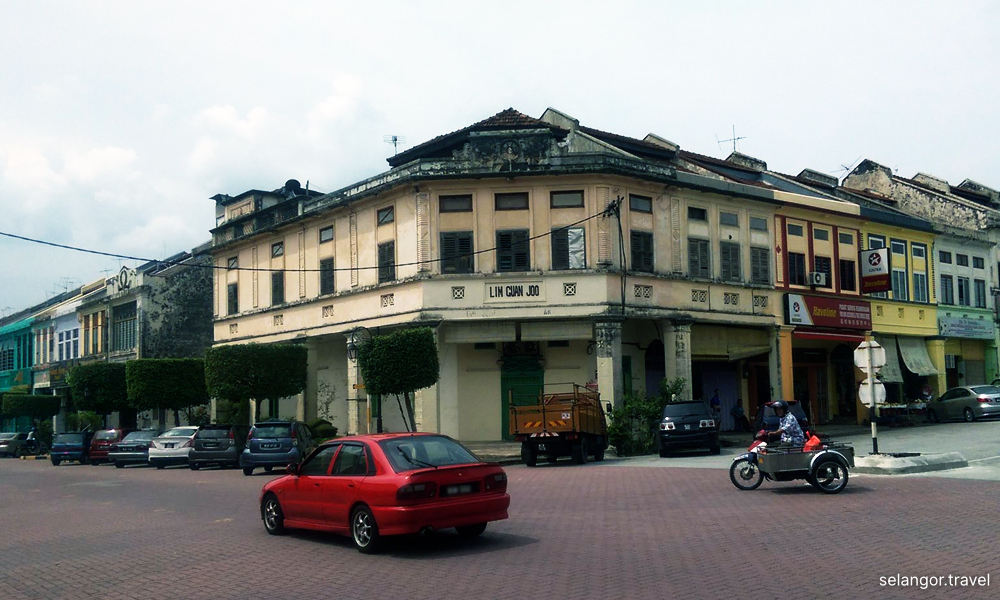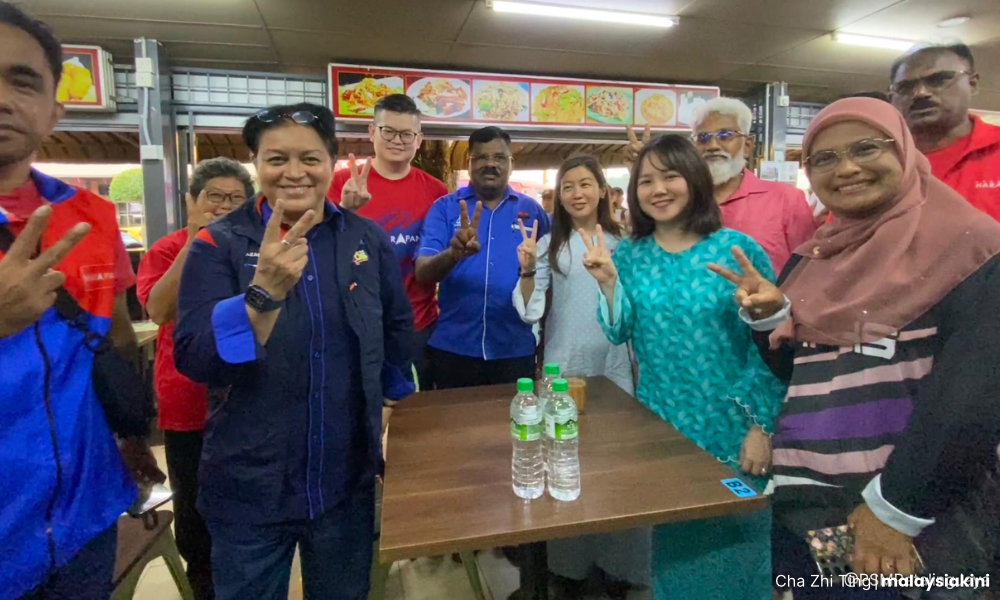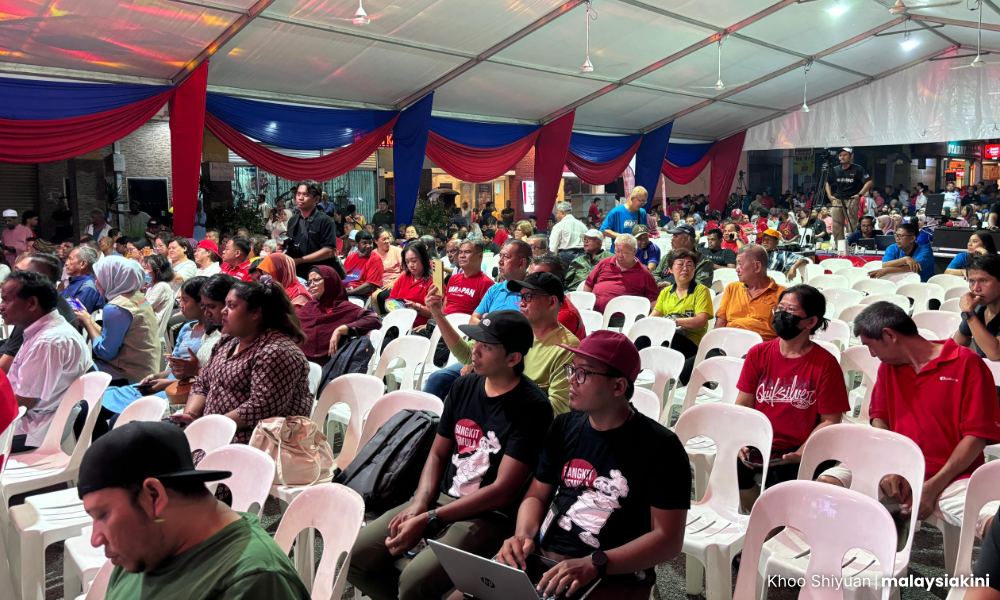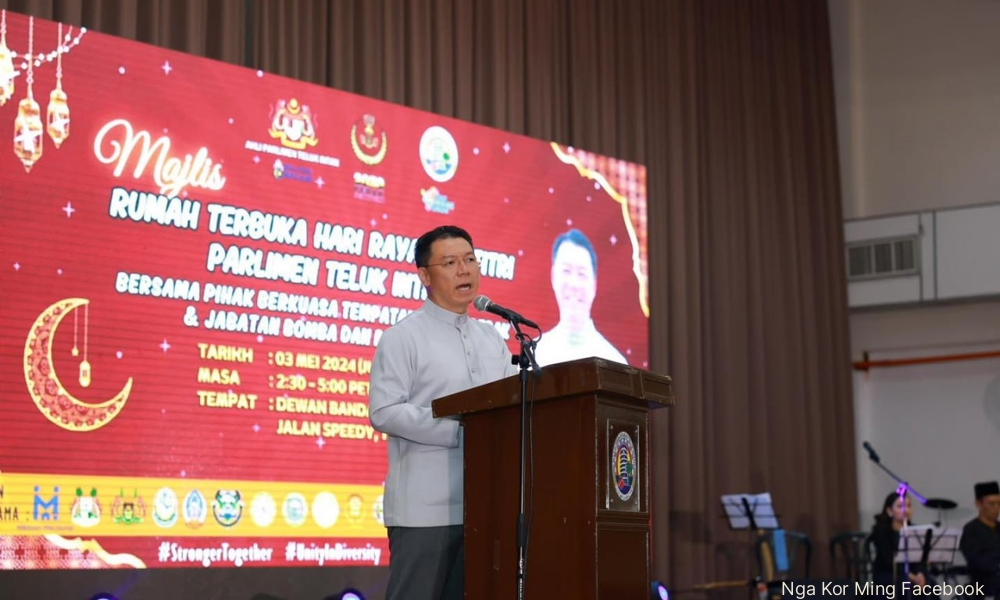The Kuala Kubu Baharu by-election is tomorrow. Unless there is a big last-minute swing, this close contest still favours the incumbent, DAP.
The lacklustre two-week campaign offers insights into how Malaysian politics is (or is not) changing. Campaigns continue to be shaped by racialised narratives and past practices, in which those in government adopt the tactics of those in previous governments, using an incumbent advantage to secure victory.
Now, over six years after the 14th general election, Kuala Kubu Baharu’s campaign showcases the entrenchment (and limitations) of race-based narratives and highlights the reliance on the incumbent advantages of control of power to stay in power.
This piece discusses how these factors have shaped the campaign.
Voices from the ground
Let’s start with sharing the views of voters in the campaign:
“All political parties are evil, but we vote for the lesser evil,” said a 70-year-old from Kuala Kubu Baharu town.
“Not sure how much of a difference my vote will make. Better to be safe than sorry,” said a 47-year-old Malay man from Kuala Kubu Baharu town.
“They are putting the stones down on the road but we will wait for the results to see if they will pave it,” said a 45-year-old Indian shopkeeper, near Lembah Beringan.
“It’s raining again in politics. The weather is hot but the rain will only cool us for a short period,” said a 50-year-old Orang Asli Woman in rural Kuala Kubu Baharu.
“I don’t care. They really don’t care,” said a 26-year-old Malay voter in rural Kuala Kubu Baharu.

There is a mistaken view that voters have not been engaged in Kuala Kubu Baharu. It would be more correct to say that neither side has inspired voters - as suggested by the comments from interviews with voters in the field. Voters are more circumspect about what is on offer.
As in most by-elections, this contest has given voters an opportunity to demand better governance.
Kuala Kubu Baharu has been a neglected constituency, not unlike many other small towns and semi-rural areas across Malaysia. The grievances are real as basic infrastructure is failing and development priorities are leaving these areas behind.
These concerns were regularly articulated by voters in on-the-ground conversations; from a lack of proper roads, inattention to floods, housing, to job shortages.
The most common focus was on the rising cost of living. If there was a new issue on the ground, it was a genuine concern about the threats of the removal of subsidies and the poorly handled implementation of Padu.
Racialised protectors
Rather than discuss policies or acknowledge problems meaningfully, politicians have largely seen this community through race.
Perikatan Nasional was the first to openly play the race card by attacking DAP’s candidate, Pang Sock Tao. Yet all sides have campaigned with race-coloured lenses, couching themselves as protectors of different communities.

PN had concentrated its campaign in the Malay areas by working with PAS, although there have been strains between the two parties (and within Bersatu itself) which have negatively impacted PN’s campaign on the ground.
PN is reasserting that they - not Umno - are protecting the Malay community. Muhyiddin Yassin’s photo - portrayed as a protector of the community - has been prominent. This message continues to have resonance, especially among younger Malays. PN will win the overwhelming support of the Malay community as a result.
The question for PN is whether the Malay swing that occurred in the 2023 state elections will continue to gain further ground. Muhyiddin and Bersatu are facing the reality that they do not have the same pull as in the past, with greater reliance on PAS in this campaign.
On its part, Pakatan Harapan has worked to shore up Chinese support, highlighting that they are the only “choice” that can protect them.
For DAP, the question is whether their traditional voters living outside will return to vote. Many Chinese voters in Kuala Kubu Baharu mentioned that the pull for family members to return was not strong, ironically due to the high cost of living experienced under the current government.
For Umno, they have encouraged their traditional Malay voters to come out rather than stay home as many did in the 2023 state polls.
The framing has been to emphasise that being in government provides an advantage, encouraging strategic voting given that other state seats in the area and the parliamentary seat are occupied by PN. Umno’s messaging remains weak as it was in the 2023 state elections.
For both the Malay and Chinese community, ethnic sentiments are there but they are not as intensely emotive as in recent campaigns.
Appeasing swing communities
This is not the case for other communities. Two communities are seen to be “swing” voters - Indians and Orang Asli.
These areas are where both sides have concentrated their efforts, especially in the last week of the campaign. Appeals have ranged from spoiling their votes, staying home and switching loyalties.

Already, as my earlier Part 2 piece noted, Indian voters expressed disappointment in the 2023 state polls due to neglect and Harapan’s disgraceful disregard of this community’s welfare by both state and federal governments.
Conversations with Indian voters on the estates confirmed the emotions. One woman spoke openly of the lack of assistance and housing for her family. Another man spoke angrily about how the late incumbent DAP assemblyperson refused to visit the area and ignored calls for help. Others highlighted the lack of inclusion of Indians on either side, with fear of PN also prominent.
The campaign’s focus on the Indian community has brought both anger and hope that the attention will yield results.
There were similar sentiments in the Orang Asli communities, especially in areas badly hit by floods.
The challenge for smaller-in-number vulnerable communities is about not being ignored and gaining sustainable support. They realise the funds coming down in the campaign are temporary.
Nevertheless, the by-election campaign has yielded some attention and needed financial assistance to these marginalised groups; it is largely an approach of temporary appeasement rather than broader strategies and policies to address underlying problems.
The common view is that these communities - Indians and, to a lesser extent due to their smaller numbers, the Orang Asli - will shape the outcome of the Kuala Kubu Baharu by-election.
They do matter, but the result will not be determined by these communities alone. Every vote will count across all of the communities.
Incumbency advantage
As the by-election campaign has evolved, the incumbency advantage has become more prominent.
Early in the campaign, attention was focused on the RM5.21 million allocation for long overdue public infrastructure upgrading works in Hulu Selangor. This was evident in the campaign as at least one road in Lembah Beringan was being repaired.
The new federal allocation includes 14 projects worth RM4.82 million in the Chinese New Village Project in Hulu Selangor, under the supervision of the local municipal council.

Later in the campaign, additional funds were promised to support housing in rural estates.
For example, RM75 million has been allocated to construct public housing units in Nigel Gardner, Kuala Kubu Baharu, to tackle housing issues. The lack of affordable housing is a problem facing estate Indian communities across Malaysia, including in Selangor.
Ironically, Kuala Kubu Baharu illustrates a political dynamic that has come full circle.
Traditionally, BN used its incumbency advantage to woo voters with promises of infrastructure and development. Now, this is being used by DAP/Harapan in their campaign, disadvantaging the opposition PN.
It should be noted that this area was also starved of a fair parliamentary allocation as it was won by the opposition. PN’s use of resources in the campaign has been both curtailed and overshadowed as the opposition holds neither state nor federal power.
Voters have been made even more conscious in this campaign about who controls resources and who does not. The incumbency advantage works in Harapan’s favour.
Protecting the people?
For Kuala Kubu Baharu voters, the by-election has at long last provided some relief such as modest measures to improve living conditions in the community. After years of neglect, there is much more to be done.
The win-over-our-group-and-hope-to-win-a-bit-of-the-other-group campaign, however, has illustrated the entrenchment of established practices in national politics - race and control of resources.
The focus has been primarily on protecting the fort and winning the constituency, with additional protection to the people only a product of political necessity rather than meaningful changing governance. Appeals have not moved beyond old practices.
Kuala Kubu Baharu should be providing lessons about the costs of political neglect and the limitations of race-based politics. It is clear that neither side is learning these lessons.
While there will be movement in voting and PN still has a fighting chance, the end result will likely be the status quo as politics is still in the status quo. - Mkini
BRIDGET WELSH is an honourary research associate of the University of Nottingham’s Asia Research Institute, a senior research associate at Hu Fu Center for East Asia Democratic Studies, and a senior associate fellow at The Habibie Centre. Her writings can be found at bridgetwelsh.com.
The views expressed here are those of the author/contributor and do not necessarily represent the views of MMKtT.



No comments:
Post a Comment
Note: Only a member of this blog may post a comment.